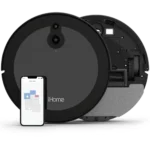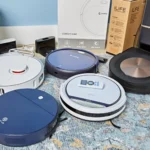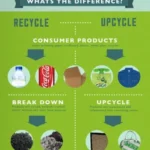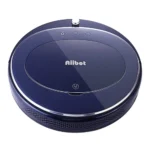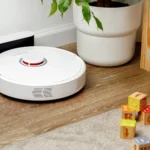Picture yourself vacuuming your home with an old, bulky machine that consumes a lot of energy, creates a lot of noise, and releases dusty air. Now imagine using a sleek, quiet, and efficient machine that navigates your home on its own, cleans with precision, and reduces your electricity bill. It might sound like a fantasy, but smart vacuum cleaners exist and they offer a plethora of environmental benefits that are worth exploring. In this article, we will delve into the world of smart vacuum cleaners and showcase how they can improve energy efficiency, reduce emissions, and conserve natural resources. By the end of this, you may just consider upgrading your vacuum cleaner to help save the planet.
Energy Efficiency
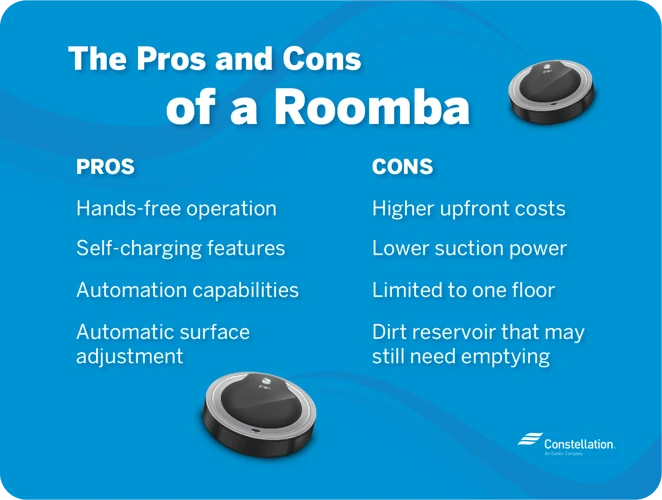
When it comes to cleaning your home, using a smart vacuum cleaner can provide numerous benefits. One of the most notable advantages of these innovative devices is their energy efficiency. Unlike traditional vacuum cleaners, which can consume a significant amount of energy, smart vacuums are designed to operate in a way that minimizes power usage. By utilizing advanced scheduling features and automated navigation, these vacuums can clean your home effectively while using the least amount of energy possible. Let’s take a closer look at how these features work and why they’re so beneficial. If you want to learn more about scheduling features, you can check our article here.
Scheduling Features
Smart vacuum cleaners offer numerous scheduling features that allow users to manage their cleaning routines without too much effort. These features are not only convenient but also energy-saving, which reduces the environmental impact.
Scheduling Features
Smart vacuum cleaners come with scheduling features designed to enable users to set up their cleaning routines according to their preferences. These features eliminate the need for a human operator to initiate the cleaning process, which saves time and energy.
One scheduling feature that smart vacuum cleaners offer is the ability to “set and forget.” This feature enables users to schedule the cleaning process at specific times during the day. For example, you can schedule your smart vacuum to clean your living room every day at 2 PM. This feature is particularly useful for busy homeowners who do not have the time to vacuum at specific intervals.
Another scheduling feature that smart vacuum cleaners offer is remote programming. This feature allows users to initiate the cleaning process from their smartphones or other devices, meaning that they can clean their homes from anywhere, at any time. This feature is particularly useful for elderly or disabled individuals who may have difficulty moving around their homes.
Finally, smart vacuum cleaners offer scheduling features that allow users to select specific areas of their home for cleaning. This feature ensures that the smart vacuum cleaner only cleans the areas that require it, saving time and energy.
Smart vacuum cleaners are an excellent option for anyone who wants to keep their home clean without investing too much time or energy. The scheduling features of these devices make them particularly attractive to busy homeowners, disabled individuals, and the elderly. By reducing the energy required to clean a home, smart vacuum cleaners are also an eco-friendly choice.
If you’re interested in learning more about smart vacuum cleaners and their various benefits, be sure to check out our article on how smart vacuum cleaners improve indoor air quality.
Automated Navigation
Automated Navigation: One of the environmental benefits of smart vacuum cleaners is their automated navigation feature, which allows them to effectively clean an area without wasting energy or time.
Smart vacuums are equipped with sensors and mapping technology that help them determine the layout of a room and navigate around obstacles such as furniture, walls, and other objects. This ability to “see” and “think” while cleaning allows the smart vacuum to clean more efficiently by avoiding unnecessary repetitions, reducing the amount of energy consumed during the cleaning process.
In addition to saving energy, smart vacuums also help save time for busy people. With their scheduling features, you can set them to clean at a specific time, without you having to manually turn them on, so you can focus on other important tasks. This feature is especially helpful for the elderly or disabled who may have difficulty moving around, or pet owners who need to keep their home free of pet hair and dander.
Smart vacuums with automated navigation don’t get lost or lose their way around your home. Their advanced mapping capabilities allow them to remember the layout of your home, so they can quickly carry out their cleaning duties during their cleaning cycles.
Considering that traditional vacuum cleaners require a lot of manual effort and attention, switching to a smart vacuum can be a sustainable choice for homeowners who wish to optimize energy consumption. Using a smart vacuum with automated navigation is an excellent way to save time and energy, and it is highly recommended for those who care about preserving their environment.
If you would like to learn more about how smart vacuums are ideal for pet owners, follow this link to our informative article: /benefits-smart-vacuum-pet-owners/.
Reduced Emissions
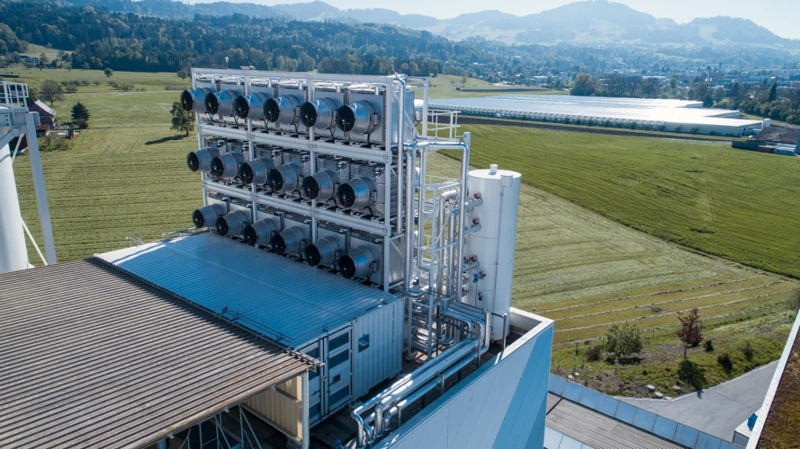
Reduced emissions is a crucial aspect of modern-day technology, and the advent of smart vacuum cleaners has a significant impact on the environment. These vacuum cleaners use advanced mechanisms and tools that minimize the amount of pollutants in the air, making them an environmentally sustainable cleaning solution. With recent advancements in technology and the integration of high-efficiency filters and bagless technology, smart vacuum cleaners are able to reduce emissions to a great extent. Additionally, their automated navigation ensures that they cover every corner of your home and remove all the debris, dust and harmful substances that may be present. In the following sections, we will explore the features of smart vacuum cleaners that are responsible for reducing emissions in greater detail.
High-Efficiency Filters
Using a smart vacuum cleaner can also contribute to the reduction of emissions, thanks to its high-efficiency filters. These advanced filters capture even the tiniest particles that a traditional vacuum cleaner might not be able to pick up. The high-efficiency filters assist in removing tiny pollutants like pet dander, dust mites, and pollen from your home. These allergens are rarely visible to naked eyes and can result in allergies and asthma. The smart vacuum cleaner’s high-efficiency filters can capture dust of up to 0.3 microns.
High-efficiency filters are more environmentally-friendly than regular filters. They help in reducing the amount of waste that ends up in landfills by not requiring frequent replacements. Traditional vacuum cleaners often require replacement every three to six months, resulting in a massive pile-up of discarded filters over time.
Smart vacuum cleaners, on the other hand, may only need a filter replacement once a year, resulting in significant waste and cost savings. By reducing the need for frequent replacement, the smart vacuum cleaner helps in conserving natural resources.
The elderly or disabled individuals, who may face mobility challenges, will also benefit from using smart vacuum cleaners with advanced filters. As a smart vacuum cleaner can clean more efficiently than a conventional vacuum and can be scheduled to automatically clean the space, it can help in maintaining indoor air quality for those who cannot vacuum their homes as often.
To learn more about the benefits of smart vacuum cleaners, read our article on Smart Vacuum Sensors and Mapping Technology.
Bagless Technology
One of the major environmental benefits of smart vacuum cleaners is the use of bagless technology. These devices do not require bags that are usually made of paper or plastic and need to be replaced frequently. This reduces waste and results in cost savings for the consumer. The bagless technology also helps in reducing emissions.
Improved Efficiency: Bagless technology makes use of a container to collect dust and debris. This container can be easily emptied and cleaned after each use. This means that the vacuum cleaner maintains its efficiency and suction power, leading to more effective cleaning. Traditional vacuum cleaners, on the other hand, lose suction power as the bag fills up.
Cost Savings: Smart vacuum cleaners that use bagless technology save consumers money on a regular basis. Bag replacements are expensive and need to be purchased frequently, especially if you have to vacuum regularly. Bagless technology eliminates this expense, making it a more affordable option in the long run.
Environmental Impact: Bagless technology significantly reduces the amount of waste produced by vacuum cleaners. Bags made of paper or plastic can take years to decompose, adding to the landfill problem. Bagless technology eliminates this issue, making it a more environmentally friendly option. Additionally, the production and transportation of new bags require energy and resources, which also contribute to carbon emissions.
Smart vacuum cleaners with bagless technology have several environmental benefits. They not only provide improved cleaning efficiency and cost savings, but they also reduce waste and have a positive impact on the environment. Users who are looking to adopt more sustainable practices in their homes can greatly benefit from using a smart vacuum cleaner with bagless technology.
Internal Link: To learn more about the benefits of smart vacuums compared to traditional vacuums, check out our article on Smart Vacuum Cleaners vs Traditional Vacuum Cleaners: Which Is Better?
Natural Resource Conservation
As we strive to create a more sustainable future, it is important to consider the impact that our everyday actions have on the environment. One way we can make a positive change is by investing in smart vacuum cleaners. Not only do they offer numerous energy-saving benefits, but they also contribute to natural resource conservation. By using advanced technologies, smart vacuums have longer lifespans and consume less energy, making them a smarter choice for those who are looking to reduce their carbon footprint. And with features suited for everyone, including the elderly and disabled, the transition to sustainable cleaning has never been easier.
Reduced Energy Consumption
One of the major environmental benefits of using smart vacuum cleaners is their reduced energy consumption. Regular vacuum cleaners often waste a lot of energy because they run for longer durations and consume more power compared to smart vacuum cleaners.
Smart vacuum cleaners have features like scheduling capability and automated navigation, which make them energy efficient. With scheduling features, the vacuum cleaner can be set to clean at certain times of the day when it’s most needed. This avoids unnecessarily running the vacuum cleaner for extended periods and helps save energy. Automated navigation features allow the smart vacuum cleaner to map out the room and intelligently clean only the required areas, without running for extended periods.
Aside from scheduling and navigation features, smart vacuum cleaners also use high-efficiency filters and bagless technology to reduce energy consumption. High-efficiency filters trap dirt and allergens, reducing the need for the vacuum cleaner to run for extended periods of time. Bagless technology eliminates the need to replace bags, which could cause the vacuum cleaner to consume more energy.
With smart vacuum cleaners’ reduced energy consumption, households can save money on energy bills while reducing their carbon footprint. Plus, families with elderly or disabled members can enjoy a cleaner home without having to expend physical energy to vacuum.
Longer Lifespan
One environmental benefit of smart vacuum cleaners that is often overlooked is their longer lifespan. This is mainly due to their efficient design and high-quality materials, which result in less wear and tear over time.
Here are some reasons why smart vacuums have a longer lifespan:
- Advanced sensors allow them to avoid obstacles and prevent collisions, reducing the risk of physical damage.
- Smart vacuums have improved motors and suction power, which makes them more efficient at picking up dirt and debris, resulting in less strain on their mechanisms.
- Many models come with durable, washable HEPA filters that can be reused multiple times, eliminating the need for frequent replacements.
- Their batteries are designed to have a longer lifespan, thanks to their energy-saving features and advanced power management systems.
- Smart vacuums have a self-cleaning feature that removes any clogs or debris stuck inside the machine, which prevents the motor from overheating and breaking down.
In addition to their longer lifespan, smart vacuums are also designed to be user-friendly and require less maintenance than traditional vacuum cleaners. This means that elderly, disabled or busy individuals can benefit greatly from their use.
Smart vacuums are especially helpful for elderly or disabled individuals who may have difficulty using traditional vacuums. With smart vacuums, they can easily and safely clean their homes without struggling with heavy equipment or bending over.
The longer lifespan of smart vacuums is just one more reason why they are a smart investment for anyone looking to reduce their environmental impact and improve their quality of life.
Conclusion
It’s clear that smart vacuum cleaners offer a multitude of environmental benefits, including energy efficiency, reduced emissions, and natural resource conservation. By utilizing scheduling features and automated navigation, smart vacuum cleaners can save energy and time while still effectively cleaning homes and buildings. Additionally, high-efficiency filters and bagless technology reduce emissions and lower the impact on the environment.
But it’s not just about the environmental benefits. Smart vacuum cleaners also offer convenience and ease of use, with features such as voice control and mobile app integration. This means users can quickly and easily clean their homes while also reducing their environmental impact.
Furthermore, the longer lifespan of smart vacuum cleaners means that users don’t need to constantly replace and dispose of their vacuum cleaners, which would contribute to waste and environmental harm.
Overall, investing in a smart vacuum cleaner not only benefits the environment but also makes cleaning easier and more convenient for users. By choosing a smart vacuum cleaner, individuals can make a small but significant difference in reducing their carbon footprint and protecting natural resources for future generations.
Frequently Asked Questions
What makes a vacuum cleaner “smart”?
A smart vacuum cleaner generally has advanced technologies such as scheduling features, automated navigation, Wi-Fi connectivity, and voice control capabilities. These features increase the efficiency and convenience of cleaning, while also reducing energy usage, emissions and waste.
What are the benefits of scheduling features in a smart vacuum cleaner?
Scheduling features allow you to program your vacuum cleaner to clean your home automatically at specific times, reducing the need for constant manual operation. This not only saves time and effort but also helps reduce energy consumption by only cleaning when necessary.
How does automated navigation make a smart vacuum cleaner more environmentally friendly?
Automated navigation allows smart vacuums to map out the layout of your home and avoid unnecessary or duplicate cleaning. This reduces unnecessary wear on the vacuum and ensures that cleaning is done in the most effective and efficient way, saving energy and reducing emissions.
What is the significance of high-efficiency filters in a smart vacuum cleaner?
High-efficiency filters help to trap more dirt and allergens, preventing them from escaping back into the air during cleaning. This makes a smart vacuum cleaner an excellent choice for people with allergies or respiratory issues, while also reducing environmental impacts by improving indoor air quality.
Why are bagless technology vacuums more environmentally friendly?
Bagless technology significantly reduces the amount of waste created by vacuum cleaners. This helps to reduce the volume of waste in landfills, as well as save resources by eliminating the need for wasteful disposable bags. This makes bagless vacuums a much more eco-friendly option.
How does reduced energy consumption make a smart vacuum cleaner eco-friendly?
Smart vacuums use advanced technologies to optimize energy consumption and reduce waste. This ensures that the vacuum uses the minimum amount of power required to complete the job effectively. As a result, you save money on your power bill and reduce emissions by using less energy.
What is the relation between longer lifespan and natural resource conservation in a smart vacuum cleaner?
Smart vacuums are built with high-quality materials and advanced design to ensure longevity. A longer lifespan means fewer resources are required to produce new units and less waste is generated, reducing the environmental impact of vacuum cleaner manufacturing and disposal.
Can smart vacuum cleaners contribute to a cleaner environment?
Yes. Smart vacuum cleaners use technologies that increase energy efficiency, reduce emissions and waste, and conserve natural resources, making them a more environmentally friendly option than traditional vacuums. They contribute to a cleaner environment by improving indoor air quality, reducing landfill waste, and saving energy resources.
How can smart vacuum cleaners help reduce carbon footprints?
Smart vacuums help reduce carbon footprints by minimizing energy consumption, using optimized cleaning routes, and reducing waste. They consume less energy than traditional vacuums and have features like scheduling and automated navigation to limit unnecessary cleaning. These features save energy and reduce carbon emissions, contributing to a cleaner environment.
Are smart vacuums more expensive than traditional vacuums?
Smart vacuums may cost more upfront than traditional vacuums, but they are generally a better investment in the long run. The advanced technologies used in smart vacuums can save energy, prolong the lifespan of the vacuum, and reduce waste, which can all lead to lower costs in the long term.

